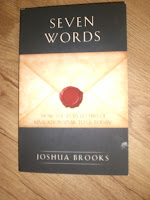 |
| My hardy front door flowers--in snow |
But I like that word—lavish. Our English word comes from the French lavasse or lavache, meaning “a torrent or rain, deluge.” Or it may derive from Italian, just across France's border, where lava also means “a torrent or stream” from the Latin lavare, “to wash.” If you're thinking about the Italian volcano Mt. Vesuvius, you're on the right track.
On a more ordinary level, in late summer and fall, a lavish perennial blossom clump sprouts in the barrel planter by my front door. Well, “lavish” for my poor gardening skills. But when new blooms come up each spring from the soil where last year's flowers die, I am reminded that God delights in such displays of creation.
I started to do some thinking about our English word “lavish.” We connect it with profusion, like “lavish spending” or “lavish giving.” (Cue up the holiday mall music.) It also might ring a bell of the uncontrolled spending (“lavish living”) of the Prodigal Son. Or of his father's over-the-top celebration (a party complete with the fatted calf) for his son's return. And, below that story line, an illustration of God's lavish love for us, His wayward sons and daughters.
But there's another Biblical word about “above and beyond” that recently got my attention. It's the Greek perisseuo, which means “over and beyond.” Think: Jesus' miracles of feeding the multitudes in Luke 9 and John 12. The crumbs of bread and bits of fish fed thousands, and when the leftovers were collected, they amounted to a miraculous heap. The feeding was a perisseuo—over-and-beyond—miracle of God's care and provision.
How great and deep is the Father's love toward us? We cannot measure it. All our materialism and gifting are a pittance in comparison to all God does to show His love for us.
Take a minute to sing along with this contemporary praise song by Stuart Townend (b. 1963) about God's lavish love:
HowDeep the Father’s Love For Us - Lyrics, Hymn Meaning and Story(godtube.com)





